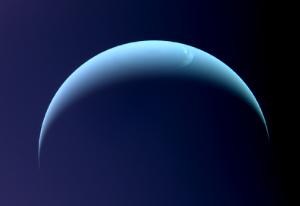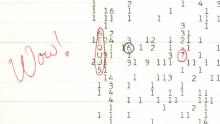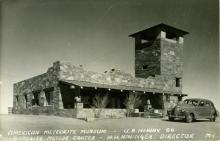Voyager 2 captured this view of the giant planet Neptune shortly after flying past it in 1989. The image has been reprocessed to reveal subtle cloud features and other details in the planet's atmosphere. Methane in the upper atmosphere absorbs red light, making Neptune look blue. [NASA/JPL/Kevin M. Gill]
You are here
Neptune at Opposition
To paraphrase a famous saying, the pen is mightier than the telescope — at least sometimes. 175 years ago this month, for example, astronomers discovered the planet Neptune. It wasn’t through weeks of long nights at the telescope. Instead, it took only one night. An astronomer had calculated where the planet should appear, so he told his colleagues just where to look.
The discovery was based on discrepancies in the orbit of Uranus, the seventh planet from the Sun. Two scientists calculated that Uranus was being pulled by the gravity of an unseen planet even farther from the Sun.
French astronomer Urbain Le Verrier and British astronomer John Couch Adams both passed along their calculations to others. Adams didn’t get much support for a search. But Le Verrier did. He sent a letter to the Berlin Observatory. Johann Galle received the letter on September 23rd, 1846, and found the planet that night.
As it turned out, Le Verrier’s calculations were off, so it was a bit of luck that the planet was found. As astronomers tracked it, they refined its orbit. And they named it “Neptune” for the Roman sea god.
And we can tell you just where to find Neptune right now. It lines up opposite the Sun, so it’s in view all night and shines brightest for the year. Even so, you need good binoculars or a telescope to see it. It’s near the border between Pisces and Aquarius, far to the lower left of the brilliant planet Jupiter.
More tomorrow.
Script by Damond Benningfield
Get Premium Audio
Listen to today's episode of StarDate on the web the same day it airs in high-quality streaming audio without any extra ads or announcements. Choose a $8 one-month pass, or listen every day for a year for just $30.






